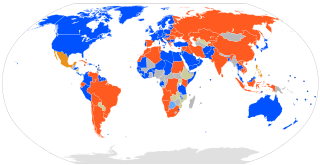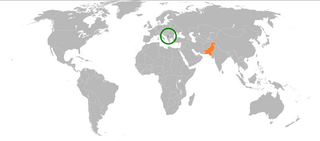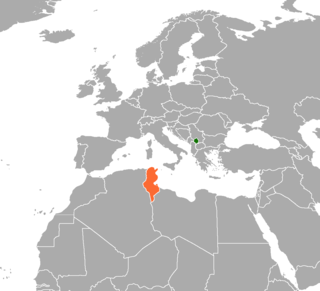 | |
Kosovo | Lebanon |
|---|---|
Kosovar–Lebanese relations are foreign relations between Kosovo and Lebanon. Formal diplomatic relations between two states are non-existent as Lebanon does not recognize Kosovo as a sovereign state.
 | |
Kosovo | Lebanon |
|---|---|
Kosovar–Lebanese relations are foreign relations between Kosovo and Lebanon. Formal diplomatic relations between two states are non-existent as Lebanon does not recognize Kosovo as a sovereign state.
At a meeting on 28 May 2009 with Kosovo's Foreign Minister, Skënder Hyseni, the representative of Lebanon to the United Nations, Nawaf Salam, reportedly said that Lebanon would continue to support Kosovo and that the government of Lebanon is seeking the moment for recognition. [1] In a November 2009 meeting between an Albanian delegation led by Deputy Foreign Minister, Edith Harxhi, and Lebanese officials including prime minister Saad Hariri, the Lebanese side reportedly said that Lebanon would soon recognise Kosovo. [2] However, the Lebanese ambassador in Belgrade, Cehad Mualem, was later reported as saying that there was no possibility of Lebanon recognising Kosovo in the near future, and said that Lebanon would wait for the decision of the International Court of Justice. [3]
In a February 2012 meeting with the speaker of Albanian Parliament, Jozefina Topalli, the Lebanese prime minister, Najib Mikati, said that the issue of Kosovo's recognition was being considered very seriously. [4]
In December 2013, Lebanese Foreign Minister Adnan Mansour promised to consider Kosovo's request for recognition. [5]
On 29 November 2018, Lebanese Foreign Minister Gebran Bassil visited Belgrade and affirmed in a joint press conference with his Serbian counterpart, Ivica Dačić, that Lebanon supported "the sovereignty and territorial integrity" of Serbia. Bassil also added "Lebanon and Serbia share common sovereign tendencies, as well as their rejection of division and isolation." [6] [7]

International recognition of Kosovo, since its declaration of independence from Serbia enacted on 17 February 2008, has been mixed, and international governments are divided on the issue. The Government of Serbia does not diplomatically recognise Kosovo as a sovereign state, although the two countries have enjoyed normalised economic relations since 2020 and have agreed not to try to interfere with the other's accession to the European Union.

Argentina–Serbia relations refers to the diplomatic relations between Argentina and Serbia. Both nations were founding members of the Group of 77 and the United Nations.

Kosovo–Malaysia relations are foreign relations between Kosovo and Malaysia. Formal relations between the two countries first began in 2000, when Malaysia became the first Asian country to establish a liaison office in Kosovo. Kosovo declared its independence from Serbia on 17 February 2008 and Malaysia recognised it on 30 October 2008.

Egyptian–Kosovan relations are foreign relations between Egypt and Kosovo.
Kosovo's declaration of independence from Serbia was enacted on Sunday, 17 February 2008 by a unanimous vote of the Assembly of Kosovo. All 11 representatives of the Serb minority boycotted the proceedings. International reaction was mixed, and the international community continues to be divided on the issue of the international recognition of Kosovo. Slovakia's reaction to the 2008 Kosovo declaration of independence is one of non-recognition, but it has given indications that its stance could change in the future.
Kosovo's declaration of independence from Serbia was enacted on Sunday, 17 February 2008 by a unanimous vote of the Assembly of Kosovo. All 11 representatives of the Serb minority boycotted the proceedings. International reaction was mixed, and the global community continues to be divided on the issue of the international recognition of Kosovo. Greece's reaction to the 2008 Kosovo declaration of independence in general is neutral.
The Holy See does not recognise Kosovo and supports the territorial respect and integrity of Serbia and per UN 1244, part of agreement with Eastern Orthodox Church, and this has led to a warming of Holy See-Serbia relations. The Cardinal Walter Kasper, President of the Pontifical Council for Promoting Christian Unity, stated that the Holy See had not recognised the independence of Kosovo and did not intend to do so in the future.

Kosovo–Pakistan relations refer to the bilateral ties between the Republic of Kosovo and the Islamic Republic of Pakistan. Kosovo is a partially recognized state that is claimed by Serbia in its entirety as the Serbian province of Kosovo and Metohija. On 24 December 2012, Pakistan recognized Kosovo as an independent state, becoming the 98th state to do so. Simultaneously, Pakistan's ambassador to Turkey in Ankara was accredited to Kosovo.

Kosovo's declaration of independence from Serbia was enacted on Sunday, 17 February 2008 by a unanimous vote of the Assembly of Kosovo. All 11 representatives of the Serb minority boycotted the proceedings. International reaction was mixed, and the world community continues to be divided on the issue of the international recognition of Kosovo. Libya extended official diplomatic recognition to Kosovo on 25 September 2013.

Cameroonian–Kosovar relations are foreign relations between Cameroon and Kosovo. Formal diplomatic relations between two states are non-existent as Cameroon does not recognize Kosovo as a sovereign state.

Ethiopian–Kosovar relations are foreign relations between Ethiopia and Kosovo. There are no formal diplomatic relations between the two states as Ethiopia has not recognized Kosovo as a sovereign state.

Congolese–Kosovar relations are foreign relations between the Democratic Republic of the Congo and Kosovo. Formal diplomatic relations between two states are non-existent as the Democratic Republic of the Congo does not recognize Kosovo as a sovereign state.

Iraqi–Kosovar relations are foreign relations between Iraq and Kosovo. Formal diplomatic relations between two states are non-existent as Iraq does not recognize Kosovo as a sovereign state.

Kosovar–Ugandan relations are foreign relations between Kosovo and Uganda. Formal diplomatic relations between two states are non-existent as Uganda does not recognize Kosovo as a sovereign state.

There are no formal diplomatic relations between Cyprus and Kosovo as Cyprus has not has not recognized Kosovo as a sovereign state.

Kosovar–Moroccan relations are foreign relations between Kosovo and Morocco. Formal diplomatic relations between two states are non-existent as Morocco does not recognize Kosovo as a sovereign state.

Kosovar–Malian relations are foreign relations between Kosovo and Mali. Formal diplomatic relations between two states are non-existent as Mali does not recognize Kosovo as a sovereign state.

Kosovar–Tunisian relations are foreign relations between Kosovo and Tunisia. There are no formal diplomatic relations between the two states as Tunisia has not recognized Kosovo as a sovereign state.

Ecuador–Kosovo relations are foreign relations between Ecuador and Kosovo. Formal diplomatic relations between two states are non-existent as Ecuador does not recognize Kosovo as a sovereign state.

Kenyan–Kosovar relations are foreign relations between Kenya and Kosovo. Formal diplomatic relations between two states have not been officially established as Kenya has not recognize Kosovo as a sovereign state.